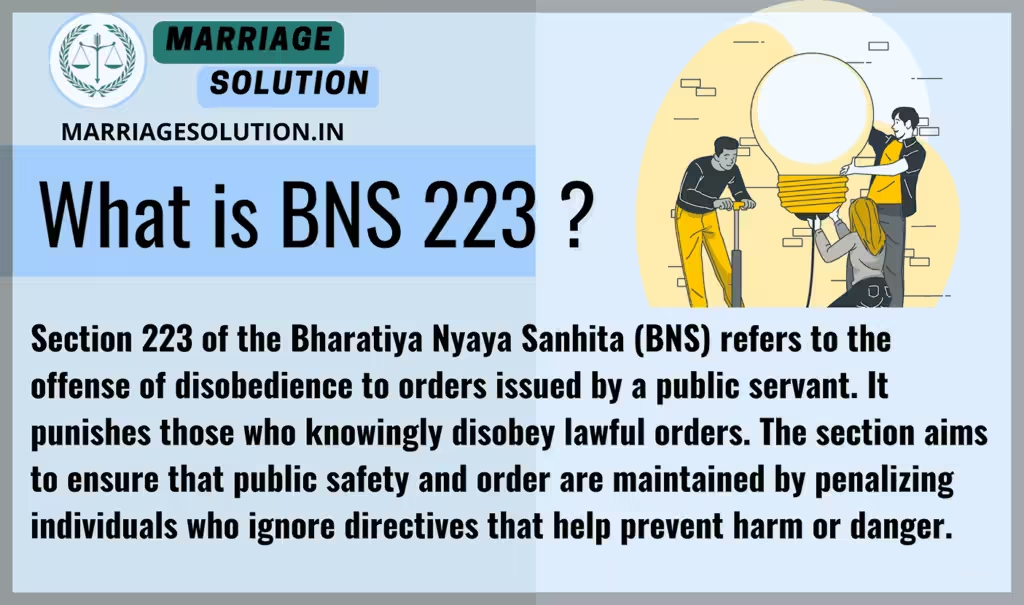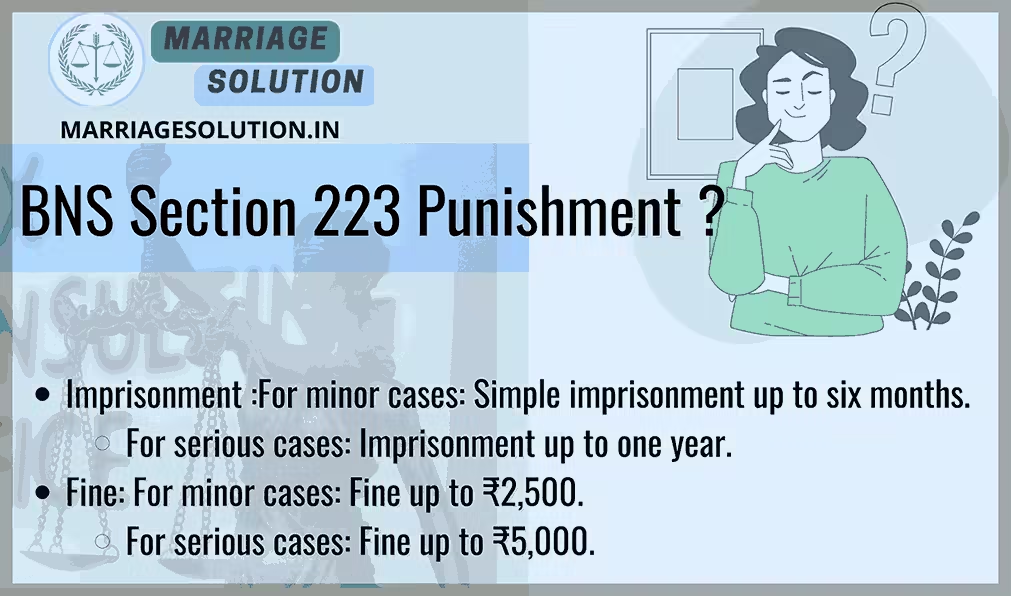Introduction of 223 BNS
223 BNS punishes disobedience of lawful orders issued by a public servant. These orders are often meant to maintain law, order, and public safety. If a person, despite knowing about such an order, chooses to ignore or violate it, they can face legal consequences. Depending on whether the disobedience causes minor annoyance or serious danger to life and safety, the punishment ranges from fines to imprisonment. This section highlights the importance of respecting lawful authority and ensures smooth functioning of government actions in the interest of society.
The Bharatiya Nyaya Sanhita (BNS) Section 223 replaces the old Indian Penal Code (IPC) Section 188.
What is BNS Section 223 ?
Section 223 of the Bharatiya Nyaya Sanhita (BNS) refers to the offense of disobedience to orders issued by a public servant. It punishes those who knowingly disobey lawful orders. The section aims to ensure that public safety and order are maintained by penalizing individuals who ignore directives that help prevent harm or danger.

BNS 223 Explain
“Whoever, knowing that, by an order promulgated by a public servant lawfully empowered to promulgate such order, he is directed to abstain from a certain act, or to take certain order with certain property in his possession or under his management, disobeys such direction, shall, on conviction, be punished—
(a) if such disobedience causes or tends to cause obstruction, annoyance or injury, or risk of it, to any person lawfully employed, with simple imprisonment up to six months, or fine up to ₹2,500, or both;
(b) if such disobedience causes or tends to cause danger to human life, health or safety, or causes or tends to cause a riot or affray, with imprisonment up to one year, or fine up to ₹5,000, or both.”
1. Meaning of “Disobedience to Order”
- This means refusing to follow a lawful order issued by a public servant who has the authority to issue such directions.
- The order may direct someone not to do something (example: stop a procession) or to do something (example: manage property in a certain way).
- Disobedience is punishable even if no actual harm happens, as long as the act could potentially cause obstruction, annoyance, injury, or risk.
2. Who is Covered?
This section applies to:
- Individuals who knowingly ignore lawful orders.
- Property owners/managers who disobey directions related to property.
- Groups or organizations that continue prohibited activities despite orders.
3. Nature of the Offence
- Cognizable → Police can arrest without a warrant.
- Bailable → Accused has the right to bail.
- Non-compoundable → Cannot be settled privately, must go to court.
- Triable by any Magistrate → Case is handled in a local Magistrate’s court.
4. Examples of BNS Section 223
- Example 1 – Minor Disobedience
A district officer orders that no vehicles should enter a particular street during a festival for crowd safety. A shopkeeper ignores this order and drives his vehicle into the street, causing obstruction and annoyance. This is punishable under clause (a). - Example 2 – Serious Disobedience
During a pandemic, a health officer orders home quarantine for a group of people exposed to infection. One person knowingly breaks the order and attends a gathering, risking the spread of disease. This is punishable under clause (b). - Example 3 – Riot Situation
Police prohibit a rally in a sensitive area to prevent riots. The organizers still go ahead with the rally, and violence breaks out. This falls under clause (b) of Section 223.
5. Punishment under BNS Section 223
- Clause (a) → Simple imprisonment up to 6 months or fine up to ₹2,500, or both.
- Clause (b) → Imprisonment up to 1 year or fine up to ₹5,000, or both.
6. Importance of BNS Section 223
- Protects public order by ensuring lawful directions are respected.
- Prevents risks to life and health, especially in emergencies.
- Strengthens government authority, ensuring smooth enforcement of laws.
- Discourages riots and disturbances by punishing those who disobey prohibitory orders.
BNS 223 Punishment
- Imprisonment
- For minor cases: Simple imprisonment up to six months.
- For serious cases: Imprisonment up to one year.
- Fine
- For minor cases: Fine up to ₹2,500.
- For serious cases: Fine up to ₹5,000.

BNS 223 bailable or not ?
Yes, the offense under Section 223 is bailable, which means the accused person has the right to apply for bail and get released while awaiting trial.
Comparison Table: BNS Section 223 vs IPC Section 188
| Section | What it Means | Punishment | Bail | Cognizable? | Trial By |
|---|---|---|---|---|---|
| BNS Section 223 | Penalizes any person who knowingly disobeys a lawful order issued by a public servant empowered to issue such orders. Aims to maintain law, order, and public safety by ensuring compliance with government directions. |
(a) Simple imprisonment up to 6 months or fine up to ₹2,500, or both (for minor obstruction or annoyance). (b) Imprisonment up to 1 year or fine up to ₹5,000, or both (if danger to life, health, or safety, or causing riot/affray). |
Bailable | Cognizable | Any Magistrate |
| IPC Section 188 (Old) | Punished disobedience of orders duly promulgated by public servants. Focused on acts causing obstruction, injury, or danger to human life, health, or safety, or tending to cause riots or affrays. |
(a) Simple imprisonment up to 1 month or fine up to ₹200, or both (for minor cases). (b) Imprisonment up to 6 months or fine up to ₹1,000, or both (for serious cases). |
Bailable | Cognizable | Any Magistrate |
| Key Difference: BNS Section 223 modernizes IPC 188 by increasing fines from ₹1,000 to ₹5,000 and imprisonment from 6 months to 1 year in serious cases. It also clarifies two levels of offences — minor and severe — strengthening enforcement against public order violations. | |||||
BNS Section 223 FAQs
What is BNS Section 223 about?
It deals with the disobedience of orders given by public servants. If someone disobeys such an order, knowing it is legally issued, they can be punished.
What is the maximum punishment under Section 223?
The maximum punishment can be one year of imprisonment or a fine of ₹5,000, or both, in cases where there is a risk to human life or safety.
Is intent to harm necessary for punishment under Section 223?
No, it is not necessary. The person just needs to know about the order and disobey it, causing or risking harm.
Can a person get bail if charged under Section 223?
Yes, it is a bailable offence.
Who can try a case under BNS Section 223?
Any magistrate can conduct the trial for offences under this section.
What if the disobedience only causes inconvenience or annoyance?
The person can be punished with up to six months of imprisonment or a fine of ₹2,500, or both, in such cases.
Conclusion
BNS Section 223 highlights that disobedience of lawful orders given by public servants is not a trivial matter but a punishable offence. The law makes a clear distinction between minor violations and serious disobedience that endangers life or public safety. By updating IPC Section 188 with stricter penalties, BNS 223 ensures greater accountability and discourages people from ignoring lawful directives. It plays a vital role in maintaining law, order, and public welfare by reinforcing respect for authority and compliance with official orders.
Need Legal Support?
If you are dealing with court cases, marriage problems, or any other legal issue, our team at Marriage Solution – Lawyer Help is here for you. Simply fill out our quick online enquiry form, and we’ll connect you with the right legal expert to support your needs.
Finished with BNS 223 ? Continue exploring the next provisions of the Bharatiya Nyaya Sanhita (BNS), 2023. Each section includes explanations, examples, and plain-language breakdowns for easy understanding.
- BNS 224 : Threat of injury to public servant.
- https://marriagesolution.in/bns_section/bns-224/
- BNS 225 :Threatening someone with harm so that they do not ask a public servant for help or protection.
- https://marriagesolution.in/bns_section/bns-225/
- BNS 226 : Trying to commit suicide with the intention of forcing or stopping a public servant from using their legal powers.
- https://marriagesolution.in/bns_section/bns-226/
Chapter XIV – Of False Evidence And Offences Against Public Justice.
- BNS 227 : Giving false evidence.
- https://marriagesolution.in/bns_section/bns-227/
- BNS 228 : Fabricating false evidence
- https://marriagesolution.in/bns_section/bns-228/
Full IPC Section List: https://marriagesolution.in/ipc-section-list
All Indian Law & Blogs: https://marriagesolution.in/indian-law/
Full BNSS Section List: https://marriagesolution.in/bnss_section-list
